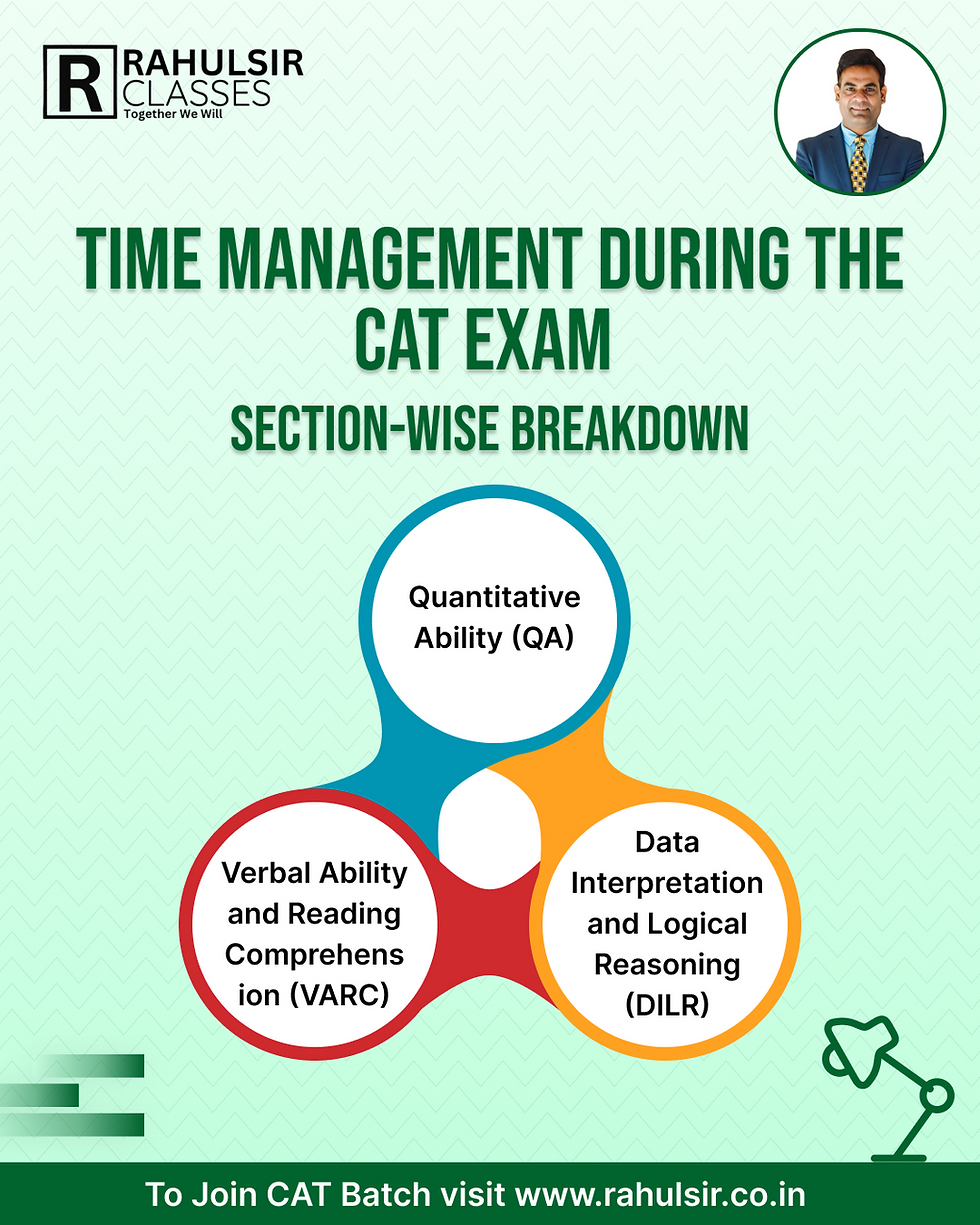Time Management During the CAT Exam: Section-Wise Breakdown
- rahulsirblogs1
- May 29, 2025
- 4 min read
A Key to Cracking the CAT Exam with Confidence
Time management is one of the most crucial aspects of the CAT (Common Admission Test) preparation and the exam day itself. With three distinct sections — Quantitative Ability (QA), Verbal Ability and Reading Comprehension (VARC), and Data Interpretation and Logical Reasoning (DILR) — each requiring a different approach, mastering time management will help you optimize your performance and maximize your score.
In this article, we'll break down the section-wise time management strategies to help you tackle the CAT exam efficiently and effectively. Let’s take a look at the ideal approach for each section.

1. Verbal Ability and Reading Comprehension (VARC)
Time Allocation: 40 Minutes
The VARC section tests your language proficiency, comprehension skills, and ability to analyze passages quickly. With 24 questions and 40 minutes, it is essential to divide your time wisely to ensure you can attempt all questions without rushing.
Time Management Tips for VARC:
Start with Reading Comprehension: Spend 25-30 minutes on reading comprehension (RC) questions, as they often carry higher weightage. Skim through the passages quickly, and focus on understanding the main idea before answering the questions.
Focus on Accuracy: Don't get stuck on tricky passages. If you don't understand a passage completely, move on and focus on others you can attempt confidently.
Keep Track of Time: Allocate 2-3 minutes per RC passage and 1-2 minutes per verbal reasoning question. This will help you maintain the pace without losing focus.
Strategize: If you struggle with time, skip the tougher questions and focus on easy ones to ensure you gather as many marks as possible.
2. Quantitative Ability (QA)
Time Allocation: 50 Minutes
The QA section evaluates your mathematical and analytical skills. With 22 questions and 50 minutes on the clock, time management is critical to ensuring you maximize your score without spending too much time on difficult questions.
Time Management Tips for QA:
Start with Easy Questions: Begin with questions that seem simple and straightforward. This will build your confidence and help you gain early marks.
Prioritize Questions You Are Comfortable With: Categorize the questions into easy, medium, and hard. Start by attempting the easy ones and then move to medium difficulty.
Don’t Get Stuck on One Question: If a question is taking more than 2-3 minutes, move on to the next one. You can always come back to it later if you have time.
Use Shortcut Techniques: Familiarize yourself with shortcut methods and formulas to reduce time spent on lengthy calculations.
3. Data Interpretation and Logical Reasoning (DILR)
Time Allocation: 40 Minutes
The DILR section focuses on problem-solving and logical reasoning. With 20 questions and 40 minutes, this section requires a strategic approach to balance accuracy and speed.
Time Management Tips for DILR:
Choose the Right Sets: DILR often presents you with multiple sets of questions. Don’t try to solve all of them. Start with the easier sets and avoid the complex puzzles unless you have sufficient time left.
Time Per Set: Allocate 10-12 minutes per set, and if you don’t find progress in the first few minutes, move on to the next set.
Avoid Guesswork: Since DILR can be tricky, avoid guessing answers. Focus on solving the problems methodically to maintain accuracy.
Stay Calm Under Pressure: DILR can be mentally taxing, so it's essential to stay calm and approach each problem logically without panicking.
Ideal Time Management Strategy for CAT Exam:
Total Time: 180 Minutes (3 Hours)
Verbal Ability and Reading Comprehension (VARC): 40 minutes
Quantitative Ability (QA): 50 minutes
Data Interpretation and Logical Reasoning (DILR): 40 minutes
Buffer Time: 10-15 minutes (for reviewing and revisiting any skipped questions)
While you can slightly adjust the time allocation based on your strengths and weaknesses, this structure helps maintain a balanced approach to each section.
Conclusion
Effective time management during the CAT exam can significantly impact your overall performance. By allocating the right amount of time to each section and employing a strategic approach, you can improve your chances of cracking the exam with flying colors.
To enhance your time management skills and prepare effectively for the CAT, start practicing with mock tests, sectional tests, and time-bound exercises. With consistent practice, you’ll develop a better understanding of your pacing and become more confident in tackling the real exam.
Ready to Ace the CAT?
Join Rahul Sir Classes today for personalized coaching and expert strategies designed to help you crack the CAT exam! With our mock tests, time management workshops, and section-specific guidance, you'll be well-prepared to maximize your score.
📞 Contact us now to schedule a free consultation and kickstart your CAT journey with us!
FAQs
Q1. How much time should I spend on each section during the CAT exam?
You should aim to spend around 40 minutes on VARC, 50 minutes on QA, and 40 minutes on DILR. Make sure to leave 10-15 minutes at the end to review any skipped questions.
Q2. What if I can’t finish a section within the allotted time?
If you’re running out of time, don’t panic. Focus on the easy questions first, and don’t spend too much time on difficult problems. Prioritize accuracy over quantity.
Q3. How can I improve my time management skills for CAT?
You can improve your time management by regularly practicing time-bound mock tests, taking sectional tests, and learning how to quickly identify the type and difficulty of questions during your preparation.
Q4. What is the best strategy for solving DILR questions under time pressure?
Choose the easier sets first, spend 10-12 minutes per set, and if you can’t make progress, move on to another set. Avoid spending too much time on any single puzzle.
Q5. Can I improve my CAT score by focusing solely on time management?
While time management is crucial, a well-rounded preparation plan including conceptual clarity, regular practice, and strategic learning is essential to improve your CAT score.



Comments